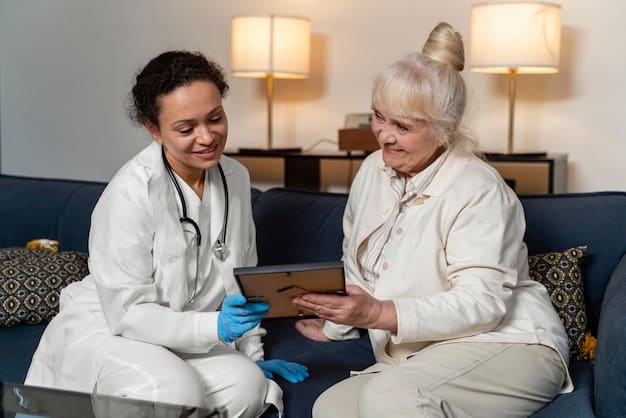Navigating Healthcare: A Caregiver’s Guide to Advocacy

Navigating the healthcare system can be overwhelming, especially for caregivers. This guide provides practical tips to effectively advocate for loved ones, ensuring they receive the best possible care and attention.
Navigating the healthcare system: Tips for caregivers to advocate for their loved one can feel like traversing a complex maze. As a caregiver, you play a vital role in ensuring your loved one receives the best possible care. This guide provides practical strategies to become an effective advocate, empowering you to navigate the complexities of healthcare and secure the support your loved one deserves.
Understanding the Healthcare System’s Complexity
The healthcare system in the United States is intricate, involving numerous parties, procedures, and regulations. For caregivers, grasping this complexity is the first step towards effective advocacy, ensuring their loved ones receive appropriate and timely care.
The Many Facets of Healthcare
The healthcare landscape includes many components, each with its own function: hospitals, clinics, specialists, insurance companies, and government agencies. Understanding how these components interact is essential for effective advocacy.
Common Challenges Caregivers Face
Many caregivers encounter hurdles, such as deciphering medical jargon, negotiating insurance claims, coordinating appointments, and understanding patient rights. Recognizing these challenges is the first step toward overcoming them.
- Understanding insurance policies and coverage options.
- Effectively communicating with medical professionals.
- Managing medical bills and financial aspects of care.
- Navigating different levels of care, from home healthcare to assisted living.
By understanding the challenges and complexities, caregivers can be better prepared to advocate effectively for their loved ones, ensuring they receive the care and support they deserve.

Building a Strong Foundation: Knowledge and Communication
Effective advocacy builds on a strong foundation of knowledge and communication. Caregivers who are well-informed and possess excellent communication skills are better positioned to navigate the healthcare system and ensure their loved ones receive the best possible care.
Gathering Essential Medical Information
Collect and organize your loved one’s medical history, including diagnoses, medications, allergies, and previous treatments. This information is crucial for making informed decisions and communicating effectively with healthcare providers.
Effective Communication Techniques
Learn how to communicate clearly and assertively with medical professionals, expressing your concerns and asking relevant questions. Active listening and clear articulation are key to ensuring your voice is heard.
- Prepare a list of questions before appointments to maximize efficiency.
- Bring a notebook to jot down important information and instructions.
- Repeat back what you understand to confirm accuracy.
- Don’t hesitate to ask for clarification if something is unclear.
By building a strong foundation of knowledge and communication, caregivers can confidently navigate the healthcare system and advocate effectively for their loved ones’ needs and preferences.
Documenting Everything: The Caregiver’s Essential Tool
Comprehensive documentation is an invaluable tool for caregivers. Maintaining detailed records of medical interactions, treatments, and other relevant information can significantly enhance the advocacy process, ensuring continuity and accuracy in care.
Why Documentation Matters
Detailed documentation helps track medical history, treatments, and medication schedules. It serves as a reliable reference during appointments and helps ensure consistency in treatment plans.
Types of Documentation to Maintain
Keep records of doctor’s visits, test results, medication schedules, insurance claims, and any other pertinent medical details. This comprehensive approach helps provide a holistic view of your loved one’s healthcare journey.
- Create a medical binder to keep all documents organized.
- Use a digital calendar to track appointments and medication schedules.
- Keep a log of symptoms, side effects, and any changes in condition.
- Save copies of all insurance claims and correspondence.
With thorough documentation, caregivers ensure accuracy and continuity in their loved one’s care, facilitating effective communication and informed decision-making.

Understanding Patient Rights and Privacy
Knowing and protecting patient rights and privacy is a cornerstone of effective advocacy. Caregivers must understand these rights to ensure their loved ones are treated with respect, dignity, and autonomy throughout their healthcare journey.
Key Patient Rights to Be Aware Of
Patients have the right to access their medical records, receive informed consent, refuse treatment, and maintain privacy. Understanding these rights ensures caregivers can protect their loved ones from potential mistreatment or negligence.
HIPAA and Protecting Health Information
The Health Insurance Portability and Accountability Act (HIPAA) protects patient privacy by regulating the use and disclosure of health information. Caregivers must be aware of these regulations to safeguard their loved ones’ personal medical data.
- Obtain HIPAA authorization to access your loved one’s medical information.
- Be aware of who has access to the patient’s medical records.
- Understand how to file a complaint if privacy is violated.
- Regularly review privacy policies and procedures to stay informed.
By understanding and asserting patient rights, caregivers empower their loved ones to make informed decisions and receive the highest standard of care, while also protecting their privacy and dignity.
Collaborating with Healthcare Professionals
Building strong relationships with healthcare professionals is essential for effective advocacy. By fostering open communication and mutual respect, caregivers can work collaboratively with doctors, nurses, and other staff to ensure their loved ones receive patient-centered care.
Building Positive Relationships
Cultivate positive relationships with medical staff through respectful communication, active listening, and expressing gratitude. These positive interactions help build trust and encourage open dialogue.
Attending Medical Appointments Together
Accompany your loved one to medical appointments, actively participate in discussions, and ask relevant questions. Your presence can provide emotional support and ensure that all concerns are addressed.
- Introduce yourself to the medical team and explain your role as a caregiver.
- Share relevant medical history and observations.
- Ask clarifying questions and take detailed notes.
- Follow up after appointments to ensure necessary actions are taken.
Collaborating with healthcare professionals not only ensures comprehensive care but also fosters a supportive environment where caregivers and medical staff work together for the best interests of the patient.
Navigating Insurance and Financial Challenges
Dealing with insurance and financial aspects of healthcare can be daunting for caregivers. Understanding coverage options, managing medical bills, and exploring financial assistance programs are essential steps to ease this burden.
Understanding Insurance Policies
Familiarize yourself with your loved one’s insurance policy, including coverage details, deductibles, and co-pays. Understanding these aspects ensures you can navigate the claims process effectively and avoid unexpected costs.
Managing Medical Bills and Claims
Keep track of medical bills, review them for accuracy, and submit claims promptly. If you encounter issues, don’t hesitate to contact the insurance company for clarification and assistance.
- Request itemized bills to ensure accuracy.
- Compare bills with the explanation of benefits (EOB) from the insurance company.
- File appeals for denied claims and keep detailed records of all communication.
- Explore options for setting up payment plans for large bills.
By effectively navigating insurance and financial challenges, caregivers can alleviate financial stress, allowing them to focus on providing the best care possible for their loved ones.
| Key Aspect | Brief Description |
|---|---|
| 📝 Documentation | Maintain detailed medical records for reference. |
| 🗣️ Communication | Communicate clearly with healthcare providers. |
| 🛡️ Patient Rights | Know and protect your loved one’s rights. |
| 💰 Finance | Understand insurance and manage medical bills. |
Frequently Asked Questions (FAQ)
▼
The first step is gathering all relevant medical information, including their medical history, current medications, and any existing diagnoses. This will provide a solid foundation for your advocacy efforts.
▼
Prepare questions in advance, take detailed notes during appointments, and don’t hesitate to ask for clarification if something is unclear. Active listening and clear articulation are key.
▼
Be aware of the right to access medical records, give informed consent, refuse treatment, and protect privacy. Understanding these rights ensures your loved one is treated with dignity and respect.
▼
Keep track of all medical bills, review them for accuracy, and submit claims promptly. If a claim is denied, file an appeal and keep detailed records of all communications with the insurance company.
▼
There are many organizations that offer support and resources for caregivers, including online forums, support groups, and respite care services. Look for those that can provide emotional and practical assistance.
Conclusion
Navigating the healthcare system: Tips for caregivers to advocate for their loved one requires dedication, knowledge, and effective communication. By understanding the complexities of the healthcare system, documenting key information, and collaborating with healthcare professionals, caregivers can ensure their loved ones receive the best possible care. Remember to utilize available resources and support networks to help you in this important role, ensuring both your loved one’s well-being and your own.





